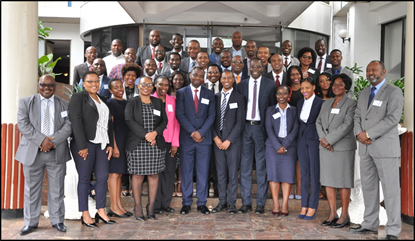- August 7, 2019
- Posted by: admin
- Category: Current News

MEFMI in collaboration with the African Institute for Remittances (AIR) conducted a regional workshop on International Remittance statistics from 15 to 19 July 2019 in Nairobi, Kenya. The workshop was attended by thirty-four officials from twelve MEFMI member countries. In terms of gender participation, there were nine (9) females and twenty-five males, translating into a 26% and 74% female and male representation, respectively.
The main objective of the workshop was to build participants’ knowledge and skills on the concepts and practical compilation practices relating to international transactions in remittances. The workshop followed international best practices articulated in the International Transactions in Remittances: Guide for Compilers and Users (2009) and Balance of Payments and International Investment Position Manual, Sixth Edition (BPM6).
Strengthening capacity of monitoring remittances in the region comes against the backdrop of the increasing importance of these flows to the MEFMI region and to Africa at large. Over the past decade, remittance inflows to the MEFMI countries have increased from US$2.4 billion in 2008 to US$7.7 billion in 2018, averaging 3.0 percent of their total GDP. Remittance flows to the MEFMI countries continue to show resilience as compared with the dwindling official aid and unstable capital flows in the face of a vulnerable global economic environment. However, there are still methodological challenges associated with the collection and compilation of remittances data, particularly in respect to flows that are channeled outside the formal financial systems. This calls for continuous capacity building efforts for member countries to strengthen reporting of these statistics.
As a key output, the workshop enhanced participants’ understanding of the best practices for collection and compilation of data on international remittances. It also provided a platform for participants to share and learn from each other, their experiences in the compilation of these statistics.
